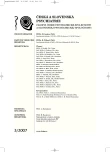-
Medical journals
- Career
Fronto-temporal Disconnection in Schizophrenia
Authors: M. Černík
Authors‘ workplace: Psychiatrická klinika LF MU a FN Brno přednostka prof. MUDr. E. Češková, CSc.
Published in: Čes. a slov. Psychiat., 103, 2007, No. 3, pp. 124-130.
Category: Comprehensive Reports
Overview
Contemporary neuropsychology contributes extensively to the understanding of those aspects of schizophrenia that are directly related to cognition. One of the most influential approaches to schizophrenia is the so-called ‘disconnection hypothesis’. This approach assumes that, in addition to disfunctions in separate brain regions, communication between them is disturbed. The cause of the disconnection may be in anatomical, neurochemical or functional disturbances. This article is aimed at functional disconnection and pays attention to dysfunctional communication between the frontal and temporal lobes. It also outlines the development of the so-called functional fronto-temporal disconnection and its hypothetical connection to various cognitive dysfunctions and psychiatric phenomena. The disturbed communication between frontal and temporal regions may cause memory, speech or executive dysfunctions. The fronto-temporal disconnection could also explain how some auditory hallucinations arise. It is not clear whether this disconnection could be one of the trait markers of schizophrenia.
Key-words:
fronto-temporal disconnection, schizophrenia, cognition, frontal cortex, temporal cortex.
Labels
Addictology Paediatric psychiatry Psychiatry
Article was published inCzech and Slovak Psychiatry

2007 Issue 3
Most read in this issue- Oculocutaneous Syndrome Associated with Prolonged Phenothiazines Therapy
- Parental Alienation Syndrome and Post Divorce Adaptation
- Fronto-temporal Disconnection in Schizophrenia
Login#ADS_BOTTOM_SCRIPTS#Forgotten passwordEnter the email address that you registered with. We will send you instructions on how to set a new password.
- Career

